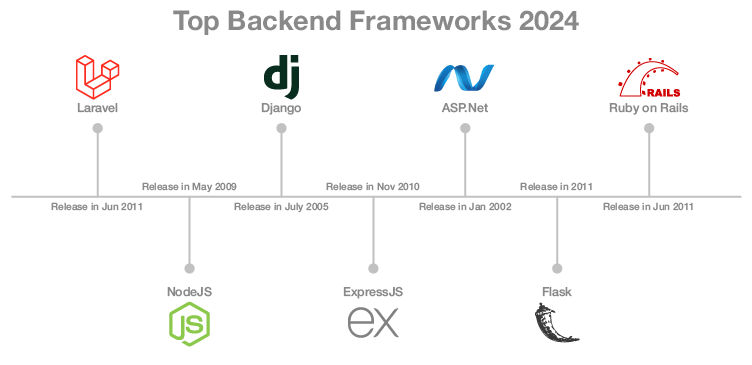Quick Summary
Backend frameworks are the backbone of any web application or Web API development. They provide a solid foundation for building scalable and robust applications, handling server-side tasks, and managing databases. Choosing the right backend framework is crucial for enhancing your development productivity and ensuring the optimal performance of your web applications.
The article delves deep into the top backend frameworks to help businesses make informed decisions for their web development projects, and developers learn the hottest backends in the market.

Top 9 Backend Frameworks 2024
1. Django
Django is a popular backend framework, powered by Python. Django is based on the Don’t Repeat Yourself (DRY) principle that focuses on reusing codes. Thus, coding with Django is quick and secure.
Django is easy to learn and user-friendly, supporting many outstanding features like REST API support. The framework offers benefits like quick development, reusable codes, and reliable solutions.
Features
- SEO Optimized
- Python Web framework
- High Scalability
- High-Security
Advantages of Django
1. Batteries Included
The prime benefit of Django is batteries included. Developers can use readymade packages to add any functionality to the web apps. Thus, it saves a lot of time and effort for developers.
2. Django is Simple
Django focuses on simplifying the development process. Thus, it covers the basics so developers can focus on creating unique or complex features.
3. Time-effective
Django offers features like ORM, caching, testing, and templates that make coding easier for developers. Besides, the framework covers the basics, making app development quick and time efficient.
4. Django Suits All Projects
Django supports developing all kinds of web apps, ranging from complex social media websites to simple blogging websites. For simple web apps, developers can quickly create a prototype. While for complex apps, it is highly scalable to handle heavy traffic.
In addition, With Django:
- One can create cross-platform apps that will run on many operating systems. (Windows, Mac, Linux)
- Django is compatible with most databases.
Disadvantages of Django
1. Not Suitable for Small Projects
Django is “batteries included,” as mentioned earlier. It comes with a host of features even for simple projects making them heavy.
2. Does not provide Multiprocessor Support
Django does not support multiprocessing, which is a must-feature currently. Other frameworks are much more flexible. Thus, many developers prefer to switch to Django alternatives.
3. No Conventionss
Django lacks the principles and rules that developers can follow to create apps. Conventions give a set path for developers to follow and implement.
Popular Websites That Use Django
- Dropbox
- Spotify
- YouTube
- The Washington Post
2. Flask
Based on Python, Flask is a micro-framework suitable for developing smaller projects. The framework is lightweight and known as a microframework because it does not use specific tools or libraries. Moreover, it does not depend on any external sources. The framework is simple to learn, easy to use, and highly flexible in creating web applications. However, Flask supports extensions to add additional features. Flask has no libraries and helps to create simple websites. Further, it can help to scale those simple web applications.
Features
- Integrated support for unit testing.
- Rapid debugger and development server.
- Jinja2 template engine, a powerful web template engine.
- Werkzeug, which offers robust web server gateway interface (WSGI) support.
- Support for secure cookies at client-side sessions.
- Extensive documentation.
- Google app engine compatibility.
- Clear and neat APIs.
Advantages of Flask
1. Easy to Use
Since the framework is very simple, it is quick for beginners to understand. They can quickly start using Flask to develop applications.
2. Very Flexible
It is easy to alter the Flask components to customize the website.
3. Testing
Flask provided integrated support for testing and debugging. Further, it has a built-in development server to make testing easier.
Disadvantages of Flask
- Developing applications with Flask is slow.
- Flask is complex to maintain and also costs higher for multifaceted systems.
- The community support is inadequate compared to Django.
- Flask lacks ORM and database.
Popular Websites that Use Flask
- Netflix
- Airbnb
- Lyft
- Mozilla
- Uber
3. Java Spring
Java Spring is a framework for building enterprise-level Java applications. It provides many features and extensions to build any Java app or web app over the Java EE platform.
Features
- IoC (Inversion of Control) Container
- Data access framework
- AOP (Aspect-Oriented Programming)
- Spring MVC
- Transaction Management
Advantages of Spring
1. Flexibility
Spring provides flexible libraries to assist developers. They can pick between the traditional XML configuration or the more modern Java-based annotations. Plus, it comes with Inversion of Control (IoC) and Dependency Injection (DI) features, giving you extensive functionality and options.
2. Light Weight
The POJO (Plain Old Java Object) implementation in Spring makes it a lightweight framework. Programmers don’t need to inherit any class and implement any interface. Spring enables the building of powerful and scalable applications.
3. Loose Coupling
Spring’s strength lies in its loose coupling through dependency injection. With Spring, developers can inject dependent components without a component knowing where they came from.
4. Declarative Support
Declarative support for caching, validation, transaction, and formatting.
5. Portable
Spring is portable to use on the server side of the web/EJB app and the client side in the swing app business logic.
6. Configuration
Spring has a consistent way of configuring separate configurations from application logic.
7. Lifecycle
The middle-tier container in Spring oversees all application components, guiding them through a well-defined lifecycle with methods like init() and destroy(), ensuring proper management and coordination.
Disadvantages of Spring
1. Complexity
Spring is a complex language to learn and work with. It requires enough expertise to operate.
2. Parallel Mechanism
Spring offers multiple options that create confusion of choice and delays.
3. No Specific Guidelines
Spring doesn’t handle cross-site scripting (XSS) on its own. To keep your application safe, you’ll need to take steps to prevent hackers from getting in. This involves implementing security measures like input validation and output encoding.
4. Lots of XML
Creating a Spring application involves dealing with many XML configurations.
4. Golang
Go (or Golang) is a statically typed open-source programming language. Thanks to a wide variety of features Go offers, it is in high demand among developers and entrepreneurs.
Developed in 2007, Google made Golang similar to C to deal with high-performing concurrent services efficiently. Go is a powerful language and a backend technology.
Features
- Concurrency Support
- Simplicity
- Powerful Standard Library
- Testing Support
- Powerful Compiler
- Go Binaries
Advantages of Go
1. Golang is Fast
Golang compiles directly to machine code without using an interpreter. It speeds up development as no intermediary steps are required. Golang is ahead of JAVA in execution speed.
2. Easy to Learn
Another advantage of GO is that it is easy to learn. Developers with a solid understanding of C and Java can easily master Go as it has the same procedure. The syntax and keywords might differ slightly, though.
3. Easy to Scale
One of the biggest benefits of Golang is its capacity to support concurrent programming. Go has Goroutines that can run simultaneously and independently.
Goroutines use only 2 KB of memory, making them lightweight and perfect for handling multiple tasks concurrently. Unlike Java threads, which can be memory-heavy, Goroutines are the opposite – lightweight and memory-efficient. You can run thousands of Goroutines without worrying about crashing your system.
Disadvantages of Go
1. Time-Consuming
Golang can be more time-consuming compared to Python due to its less descriptive nature and the need for more code. While Python often accomplishes tasks with just a few lines, Golang might require hundreds for the same job. This increased coding effort can be a hurdle, especially for teams working against tight deadlines in software development.
2. It’s A Young Language
Golang is, though, a decade older, yet is considered a relatively young language. Beginners face challenges with existing libraries, especially when connecting to other platforms. The absence of an SDK for third-party user interfaces means teams may need to write additional code to integrate multiple programs, posing a potential hurdle for those working with Golang.
Top companies using Go
- Dropbox
- Riot Games
- Twitch
Golang is an ideal backend technology for building data-intensive and complex applications. Go is a more specialized language; thus, for average projects, it can be more complex than other alternatives.
5. NodeJS
NodeJS is the most popular and high-in-demand out of all the backend frameworks. Node helps create real-time, highly scalable, data-intensive applications. Further, with asynchronous working, users can easily access data.
Statistics & Facts About NodeJS
- To develop web applications, 85% of Node.js developers use Node.js. While 43% use it to build enterprise applications.
- 67% of developers say NodeJS is their favorite language.
- Over 40,000 websites in the US run on NodeJs, making it the most popular country for Node.js development.
Features
- Single-Threaded
- Asynchronous
- Open Source
- Performance
- Highly Scalable
- Node Package Manager (NPM)
Advantages of NodeJS
1. Highly Scalable
NodeJS can handle multiple requests with a slower response time. The event-based and non-blocking nature of Node.js helps speed up the Node.js performance. Further, it allows scale solutions effortlessly.
2. Vibrant Open-source Community
The NodeJs community is constantly improving the technology to let developers access the tools for free.
3. Node.js keeps things simple
As a lightweight runtime environment, Node takes up less space and helps build applications with less effort. The latest NodeJs version takes up as little as 25.4 MB of space for Windows.
Disadvantages of NodeJS
1. Nested callback issue
NodeJS has a high risk of callback hell. Developers have to be careful running many tasks in the background. If they do so, they may fall into callback hell.
2. Processing CPU-intensive requests
NodeJS does not perform well in doing tasks that involve intensive computing. It slows down the runtime work.
Popular Websites That Use NodeJs
- Medium
- Netflix
- Yahoo
- Trello
- Paypal
- eBay
6. ASP.Net
ASP.NET core is a combined version of ASP.NET MVC and ASP.NET Web API. The framework is considered one of the best backend frameworks for building web applications. It is a lightweight, open-source, and robust framework for creating rich, interactive websites and web portals.
Features
- Cross-platform & container support
- High performance
- Asynchronous via async/ Await
- Dependency Injection
Advantages of ASP.NET
1. MVC Architecture
The MVC architecture in ASP.NET allows separate input, process, and output of the application. This three-tier architecture can efficiently handle the development aspects of software.
2. Reduces coding time
ASP.NET has various code reviews that help developers write codes without bugs. Thus, it helps save time, reduce errors, and improve code quality.
3. Scalability and High Performance
ASP.NET has features like just-in-time compilation, early binding, native optimization, and caching services. These features improve performance and scalability.
4. Language Independent
The framework is language-independent, so developers can choose the language for their application. They can even divide the application across several languages.
5. Simplicity
The common language runtime in ASP.NET and garbage collection features make it simple for developers to perform each task.
Disadvantages of ASP.NET
1. Security
ASP.NET comparatively lacks certain security features like password reset, email account verification, and username reminder. Thus, it requires extra care.
2. Costly
Compared to open-source alternatives, ASP.NET is expensive. It demands expenses like SQL Server licenses, Visual Studio licenses, Windows server licenses, etc. Additionally, the maintenance of the framework is very expensive.
3. Documentation not up to the mark
The framework’s documentation needs to be revised. Developers face issues when building MVC apps.
4. Customization
ASP.NET requires extra attention from developers while making updates to the application. Sometimes, the new version does not reflect the changes made.
Popular Websites that Use ASP.NET Core
- Microsoft
- GoDaddy
- Dell
- Visual Studio
- MarketWatch.com
7. Ruby On Rails
Ruby on Rails is another popular server-side web framework. The framework uses Ruby and Model-View-Controllers, making it a top choice among developers.With Ruby on rails, it is possible to create a web app ten times faster than other frameworks because of its dynamic nature. So, if you want to build a web application in less time, Ruby on rails will be a perfect choice.
Features
- Extensive library
- MVC pattern
- ORM and Active Record.
- Automated testing
- Convention over Configuration
- Scaffolding
Advantages of Ruby on Rails
1. Accuracy
Since ROR has an in-built automated testing feature, it detects errors at an early stage. Besides, it is easy to handle and provides precise errors.
2. Rapid development
Developing applications with ROR is quick as it offers open-source libraries called gems. These libraries help in solving many problems quickly.
3. Community Support
Ruby on Rails has active community support that frequently improves language codes and updates.
Disadvantages of Rails
1. Less Flexibility
Ruby on Rails must be more flexible in building custom applications with unique features.
2. Slow Runtime Speed
Ruby on Rails has a slower runtime speed than other frameworks, such as Django and Node.js.
Popular Websites That Use Rails
- Airbnb
- GitHub
- Hulu
- Shopify
8. Laravel
Laravel framework follows the model-view-controller architecture to create robust and efficient backends. Laravel as a framework manages many tasks, such as managing bundles, routing, queues, implementing a lightweight templating blade engine, and much more. Further, it offers an authentication library and a javascript library of ORM. These libraries make coding more accessible and secure for developers.
Key Laravel Features
- MVC Architecture
- Blade Template Engine
- Eloquent ORM
- Unit Testing with PHPUnit
- Open Source & Wide Community
Advantages of Laravel
1. Authentication
Authentication with Laravel is easier as it offers easier access and control of resources. Further, the configuration is also quick.
2. Simple API
Laravel offers simple APIs that work with SMTP, Amazon SES, mailgun, etc. It allows sending emails through cloud-based services and sending notifications.
3. Easy to learn
Laravel is a simple language and, thus, easier to learn. Developers who love coding with PHP can easily learn Laravel.
4. Dependency Injection
Laravel gives an automated and easy testing environment for loading dependencies.
5. Laravel Bundles
Laravel allows bundling and modular packaging. It allows developers to reuse the packages to save time.
Disadvantages of Laravel
- Compared to Django and Ruby on Rails, Laravel has less inbuilt support.
- Laravel is a new framework and, thus, needs to be more mature compared to frameworks like Node and Python. The two frameworks provide strong composers like NPM and Ruby gems. At the same time, Laravel composers could be stronger.
- The development could be faster with Laravel comparatively, and new developers also need help with issues.
- Being a new language, community support for Laravel is smaller than other frameworks.
Popular websites That Use Laravel
9. ExpressJS
Express is a JavaScript framework that supports the development of mobile and web apps and REST APIs. Many functions in the Express are available as plugins that enable rapid full-stack development. Express is one of the major parts of the MEAN stack and helps build almost all types of applications. For example, payment gateways, eCommerce apps, on-demand apps, etc.
Features
- Server-side programming
- Routing
- Middleware
- Templating
- Debugging
Advantages of ExpressJS
1. Faster To Build
Express supports full-stack development so a single programmer can manage the backend and front end. Thus, it speeds up the app development process.
2. I/O request handling
ExpressJS is the apt language to build applications that can easily handle many user requests and notifications.
3. Template Engines
Express easily integrates with many template engines, including EJS, Vash, Jade, etc.
4. Open-source community
Express.js has one of the most supported open-source communities to review and improve the framework.
5. Easy to learn
ExpressJs is well-documented and has large community support for tutorials. Thus, it is easy to learn ExpressJS.
Disadvantages of ExpressJS
- ExpressJS is less secure as a framework compared to other languages.
- ExpressJS requires a lot of manual work and effort by developers to avoid coding problems.
- Refactoring in ExpressJS is hard as it increases the codebase size.
Popular websites That Use ExpressJS
- MySpace
- GeekList
- Klout
- Yummly
- StudyNotes
Conclusion
Choosing the right server environment for your project will depend on its specific needs. You can choose the most fitting server framework based on your project requirement, skillset available, and budget.
For professional assistance with backend development, Upsquare Consulting Services has the expertise to provide a powerful foundation for your web applications. We leverage the full potential of cutting-edge backend technologies, ensuring scalable performance and a resilient architecture.
The backend development team at UCS has highly skilled experts who are dedicated to driving innovation. We offer end-to-end backend development services tailored to enterprises of all sizes. Feel free to contact us for any queries or project discussions.







